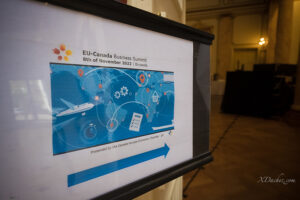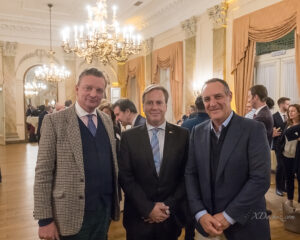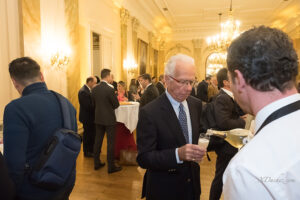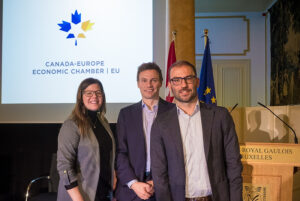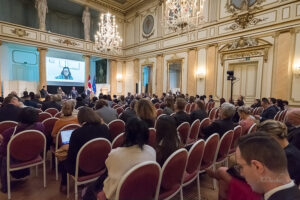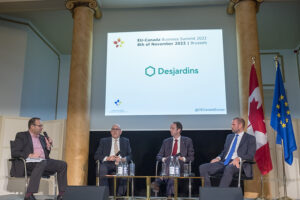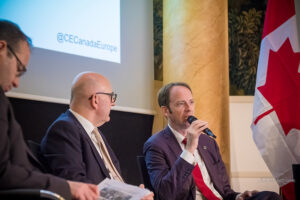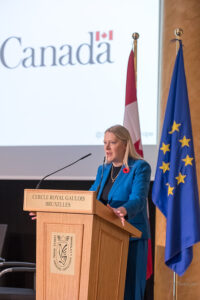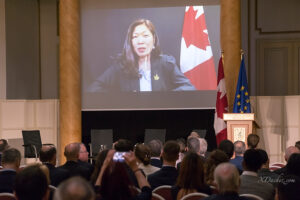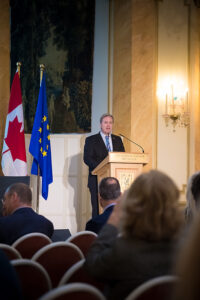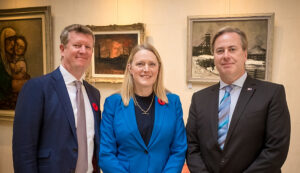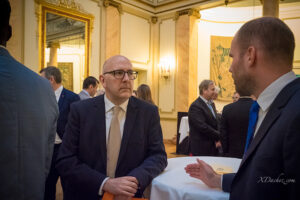EU-Canada Business Summit 2022
Description
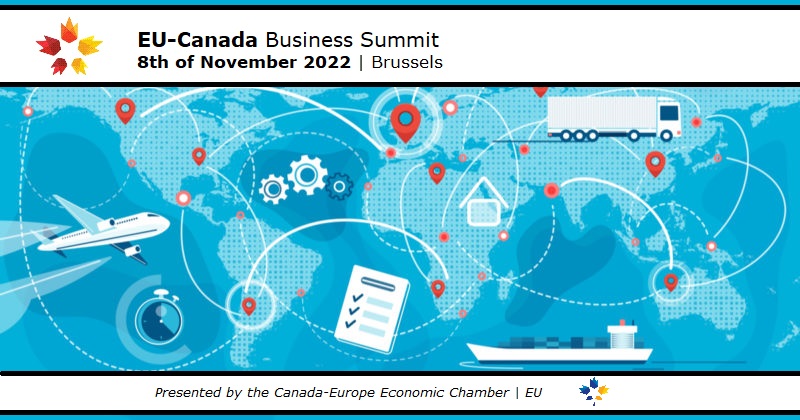
The EU-Canada Business Summit is a oneday event held once a year in Brussels, capital of the European Union, that brings together hundreds of political and business decision-makers from Canada, the EU and the world.
EU and Canada have a common history, common values, a commitment to preserving and promoting the rules-based international order and have common ambitions for the future like collaboration on trade, climate change, technology, security issues, human rights, and others.
This edition’s Summit will include 5 main topics:
- E-Commerce Trends: Powering online retail forward
- The Canada-EU partnership in a global trade transition
- Energy Security: Challenges & Opportunities
- Clean Technology & Environment
- Economics & Finance
The EU-Canada Business Summit is a great way to built business relationships through VIP cocktails, private meetings, interactive debates and several exclusive networking activities.
Number of speakers:
20 conference speakers
Number of moderator:
5
Number of participants:
350
Confirmed speakers
 Mary Ng Minister of Inter Trade, Export Promotion, Small Business & Economic Dev Government of Canada Ottawa |
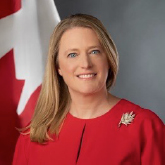 Dr. Ailish Campbell Ambassador of Canada to the European Union (EU) Global Affairs Canada Brussels |
 Jean-Pierre Vidal Chief Economic Adviser European Council Brussels |
 Nicolas Bossé Chief Energy Transition Officer Brainbox AI Montreal |
 Alexandre Gauthy PB Macro Economist Degroof Petercam Luxembourg |
 Olga Vovk Senior Regional Manager Europe EDC London |
 Côme de Bagneux Manager of Business Services Desjardins Paris |
 Kostas Rossoglou Head of Public Policy and Government Affairs Shopify Brussels |
 Gohar Sargsayan Director EU stainability, Innovation and Partnership CGI Amterdam |
 Bénédicte Bergeaud Public Affairs Manager Europe Northland Power Hamburg |
 Shannon Blanchard Director Supply Chain Innovation Port Saint-John Saint-John. NB |
 Julie Cormier Export Development Executive Opportunities New-Brunswick Fredericton |
 Denis Dumont CEO Tractebel Brussels |
 Rob Alexander CEO AlumaPower Corporation Sarnia |
 Macarena Cotaldo-Hernandez CEO & Cofounder Viridis Reearch Inc Vancouver |
 Jorge Gomez de la Fuente Head of Industrial Optimization & Special Projects Repsol Madrid |
 Andrew Bounds EU Correspondent Financial Times Brussels |
 Pascal Kerneis Managing Director European Services Forum Brussels |
 Michelle Gartland Counsellor & Senior Trade Commissioner Government of Canada Brussels |
 Constantin Gissler Senior Manager EU Public Policy Amazon Brussels |
 Kim Mackreal Journalist Wall Street Journal Brussels |
 Mark Camilleri President Canada EU Trade & Investment Association Brussels |
 Sam Ayoub Founder - President Canada-Europe Economic Chamber - EU Brussels |
For more information on visibility opportunities and available speaking slots
please contact us at or at +32.04.93.85.78.04
S'inscrire
Fermé
Date(s)
Lieu
Cercle Royal Gaulois (In-person)
Prix
Free to attend
Detailed program
2022 EU-Canada Business Summit Program
13:00 – 13:15 – Welcoming & Networking
13:15 – 13:30 – Opening Keynote
Sam Ayoub
President
Canada-Europe Economic Chamber – EU – Brussels
Mary Ng
Minister of International Trade, Export Promotion, Small Business & Economic Development
Government of Canada - Ottawa
Dr. Ailish Campbell
Ambassador of Canada to the European Union (EU)
Global Affairs Canada - Brussels
13:30 – 14:15 – Economics & Finance
Côme de Bagneux – Manager of Business Services – Desjardins – Paris
Alexandre Gauthy – Head of Private Banking – Degroof Petercam – Luxembourg
Jean-Pierre Vidal – Chief Economic Adviser – European Council – Brussels
Andrew Bounds – Moderator – Financial Times – Brussels
14:15 – 15:00 – The Canada-EU partnership in a Global Trade Transition
Mark Camilleri – President – Ceutia – Brussels
Shannon Blanchard – Director Supply Chain Innovation–Port Saint-John-Saint-John, NB
Pascal Kerneis – Managing Director – European Services Forum – Brussels
Olga Vovk – Senior Regional Manager-Europe - EDC – London
Andrew Bounds – Moderator – Financial Times – Brussels
15:00 – 15:15 – Shopify Networking Break
15:15 – 16:00 – Energy Security: Opportunities & Challenges
Denis Dumont – CEO – Tractebel – Brussels
Jorge Gomez de la Fuente–Head of Ind. Optimization & Special Projects–Repsol–Madrid
Bénédicte Bergeaud – Public Affairs Manager-Europe – Northland Power – Hamburg
Kim Mackreal – Moderator – Wall Street Journal – Brussels
16:00 – 16:45 – Clean Technology and Environment
Nicolas Bossé – Chief Energy Transition Officer – Brainbox AI – Montreal
Rob Alexander – CEO – AlumaPower Corporation – Sarnia
Macarana Cataldo-Hernandez – CEO & Cofounder – Viridis Research Inc – Vancouver
Michelle Gartland – Moderator – Government of Canada – Brussels
16:45- 17:30 – E-Commerce Trends: powering online retail forward
Kostas Rossoglou – Head of Public Policy and Government Affairs – Shopify – Brussels
Gohar Sargsyan – Head of Public Policy and Government Affairs – CGI – Amsterdam
Constantin Gissler – Senior Manager EU Public Policy – Amazon – Brussels
Julie Cormier – Moderator – Opportunities NB – Fredericton
17:30 – 18:30 – High Level Cocktail Reception
Date(s)
Lieu
Cercle Royal Gaulois (In-person)
Prix
Free to attend
S'inscrire
Fermé
